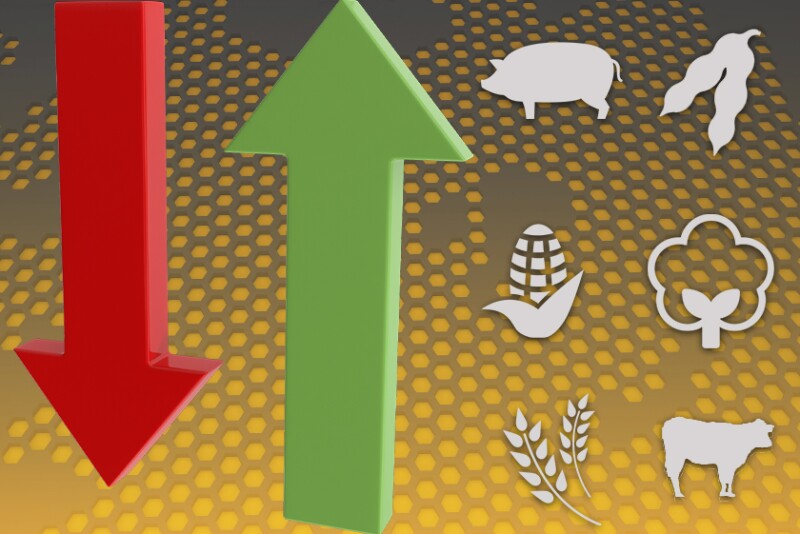GRAIN CALLS
Corn: 1 to 3 cents lower.
Soybeans: 3 to 4 cents higher.
Wheat: HRW and SRW wheat 1 to 6 cents lower, spring wheat narrowly mixed.
GENERAL COMMENTS: Soybean futures rose to three-week highs overnight amid longer-term demand optimism, while corn and wheat were mostly lower, with the SRW market near three-month lows. Malaysian palm oil futures rose 2% to the highest close in more than two weeks, while front-month crude oil was up about $1.50. U.S. stock index futures signal a firmer open. The U.S. dollar index is modestly firmer this morning after trading lower overnight.
Crop consultant Dr. Michael Cordonnier lowered his estimate for Argentina’s corn crop by 1 MMT to 49 MMT, citing “problematic” weather and early growing conditions. Dry conditions continue to limit soybean planting, with only about one-quarter of the expected crop seeded, and the forecast “does not look promising,” he added. Cordonnier kept his Brazilian soybean and corn crop estimates at 151 MMT and 125.5 MMT, respectively.
In Brazil, limited rainfall in western and some far southern crop areas has raised some concerns, “but the bottom line for most of the nation’s crops remains generally good,” World Weather Inc. said. “Rain increasing later this week through all of next week is expected to bolster soil moisture and change the moisture profile toward a general improvement over conditions recently,” the forecaster said, noting that portions of Rio Grande do Sul in the south may continue to experience some drying
Ukrainian farmers have seeded 4.5 million hectares to winter grains – or 94% of expected area as of Nov. 29 – according to the country’s ag ministry. That included 3.8 million hectares of winter wheat, 613,000 hectares of barley and 79,200 hectares of rye. Last year, Ukrainian farmers planted 6.2 million hectares to winter wheat.
Large speculators in late-November increased their bearish bets in the SRW wheat market to the highest level in 3 1/2 years. The managed money net short in SRW wheat futures and options increased 6,622 contracts during the week ended Nov. 22 to 53,402 contracts, the largest net short since May 2019, Commodity Futures Trading Commission data showed. In corn, the managed money net long fell 6,064 contracts to 170,767 contracts, the smallest since the week ended Aug. 16.
The U.S. on Monday threatened legal action against Mexico’s plan to ban imports of GMO corn in 2024, saying it would cause huge economic losses and significantly impact bilateral trade. Following a meeting with Mexican President Andres Manuel Lopez Obrador, USDA Secretary Tom Vilsack said, “I emphasized in no uncertain terms that – absent acceptable resolution of the issue – the U.S. Government would be forced to consider all options, including taking formal steps to enforce our legal rights under the USMCA. Mexico’s import ban would cause both massive economic losses for Mexico’s agricultural industries and citizens, as well as place an unjustified burden on U.S. farmers.” He also warned any such move would “have significant impact on the U.S.-Mexico trade relationship.”
President Joe Biden late Monday called on Congress to pass legislation immediately to adopt the tentative agreement between railroad workers and operators that was approved by labor and management negotiators in September “without any modifications or delay — to avert a potentially crippling national rail shutdown.”
South Korea purchased 70,000 MT of corn expected to be sourced from South America or South Africa. Turkey purchased 455,000 MT of milling wheat, with most expected to be sourced from Ukraine. Jordan made no purchases in a tender to buy 120,000 MT of milling wheat.
CORN: March corn futures traded within Monday’s range overnight, holding between support at the 10-day moving average of $6.67 1/2 and resistance at the 20-day moving average around $6.72 1/2.
SOYBEANS: January soybeans overnight touched $14.68, the contract’s highest intraday price since $14.69 on Nov. 7, the high so far this month. Buy-stop orders would likely be triggered above the November high, potentially fueling a rally back to around $15.00. Easing concerns over Covid lockdown protests in China are supporting prices.
WHEAT: March SRW wheat traded within the previous session’s range overnight, after dropping Monday to $7.73 1/4, the lowest intraday price since Aug. 19. USDA is expected to report weekly crop condition ratings following today’s close after technical problems forced the agency to delay its usual Monday release. Analysts expect the winter wheat crop’s “good” to “excellent” rating to improve one percentage point to 33%.
LIVESTOCK CALLS
CATTLE: Steady-firmer
HOGS: Steady-weak
CATTLE: Followthrough technical pressure from Monday’s lower close may burden live cattle futures but declines should be limited by expectations for continued cash strength. Packers continue to run heavy slaughters in the face of tightening market-ready supplies, helping drive cash prices to the highest levels since spring 2015. Last week’s estimated slaughter was the biggest for a Thanksgiving week since 2012, boosting the average live steer price by $3.18 to $156.07. Another large slaughter is expected this week, signaling cash prices will likely rise again, even with fresh contract supplies available to packers. Choice beef cutout values rose $2.70 to $254.53, up from a near six-week low Friday. Movement was lighter at 85 loads. February live cattle fell 45 cents to $154.675, the contract’s lowest close since Nov. 16.
HOGS: Lean hog futures may face followthrough technical pressure from Monday’s sharp declines and from continued weakness in cash fundamentals. While wholesale pork prices rebounded to start the week, the CME lean hog index is down another 93 cents to $84.63 (as of Nov. 25), the lowest since Feb. 3. Pork cutout values rose $1.89 Monday, up from a 10-month low Friday, as all cuts except butts and hams posted strong gains. Packers moved 290.4 loads of pork amid the higher prices, signaling there was strong retailer demand coming out of Thanksgiving. February lean hogs fell $3.75 Monday to $84.75, the contract’s lowest close since Oct. 14.

